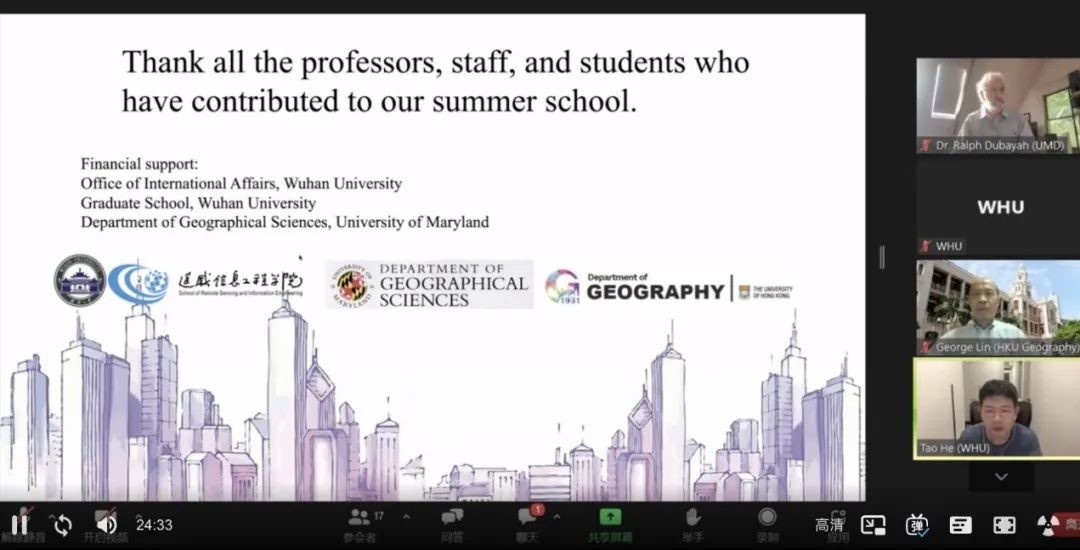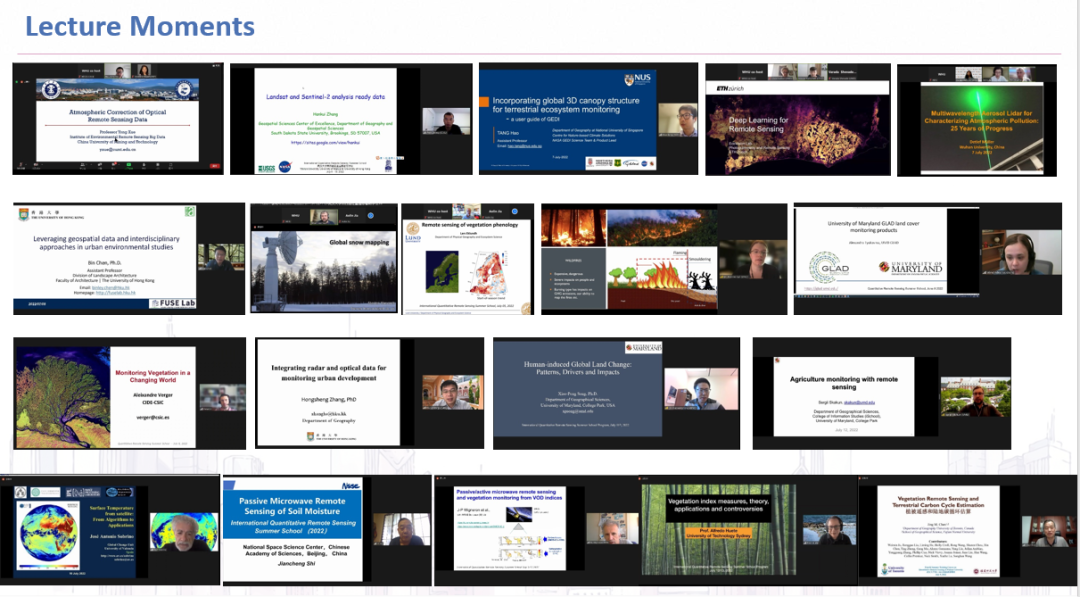From July 5th to 13th, the 4th WHU Quantitative Remote Sensing Summer School and the 1st International Quantitative Remote Sensing Summer School, sponsored by the School of Remote Sensing Information Engineering of Wuhan University, hosted by the Quantitative Remote Sensing Research Center of Wuhan University, and co-organized by the Department of Geographical Sciences at the University of Maryland and the Department of Geography at the University of Hong Kong, were successfully held. More than 5,000 students, including graduate students, undergraduates, young teachers and employees of enterprises and institutions from home and abroad, attended the summer school online.
On the evening of July 5th, the opening ceremony of the summer school was held. Prof. Liang Shunlin, the main initiator of the summer school, introduced the basic situation and curriculum arrangement of the summer school. Prof. Chris Justice, former director of the Department of Geographical Sciences at the University of Maryland, Prof. George C. S. Lin, director of the Department of Geography at Hong Kong University, and Dean Zhang Yongjun of the School of Remote Sensing Information Engineering attended the opening ceremony and delivered speeches. From July 5th to 13th, more than 50 experts and scholars, including Prof. Guo Huadong, academician of Chinese Academy of Sciences, were invited to give keynote speeches and special lectures. On the evening of July 13th, the summer school officially ended. Prof. He Tao from the School of Remote Sensing Information Engineering, WHU, summarized the curriculum data and questionnaire feedback of the summer school. Liu Xiaoli, Vice Minister of the International Exchange Department, Prof. Ralph Dubayah, Director of the International Center for Innovation in Geospatial Analytics and Earth Observation of the Department of Geographic Sciences at the University of Maryland, Prof. George C. S. Lin, Director of the Department of Geography at the University of Hong Kong, and Li Siwei, Vice Dean of the School of Remote Sensing Information Engineering attended and gave thanks.

The courses of the International Quantitative Remote Sensing Summer School cover topics such as remote sensing data processing, quantitative retrieval of land surface ecosystems and carbon cycle variables, surface radiation balance variables, surface water cycle variables, and frontier applications of remote sensing, including 21 courses in English and 32 courses in Chinese. Invited from the University of Maryland in the U.S., South Dakota State University in the U.S., the University of Toronto in Canada, Lund University in Sweden, ETH Zurich, National University of Singapore, University of Edinburgh in the United Kingdom, Spanish National Research Council, University of Valencia in Spain, the French Academy of Agriculture, University of Technology Sydney in Australia, University of Hong Kong, Peking University, Tsinghua University, China University of Mining and Technology, Beijing Normal University, Sun Yat-sen University, Aerospace Information Research Institute of Chinese Academy of Sciences and Wuhan University, 53 well-known domestic and foreign experts gave special lectures, systematically introduced the theoretical methods and applications in quantitative remote sensing research, and exchanged the latest research progress and application of quantitative remote sensing development.

During the nine-day online courses, the total valid viewing time of the students was 117,142.5 hours, far exceeding the previous three summer schools. The total number of people online viewing was more than 94,000, and the total live broadcast time was 82.5 hours. The popularity ranked first in the popular science zone of the Bilibili website for 10 consecutive days. The students listened carefully and asked questions actively. The teachers taught with heart and answered questions patiently. The summer school received a total of more than 1,300 questionnaires, and more than 90% of the students were satisfied with the teaching and organization of this summer school. Most students hope to further increase the content of full English courses.
With the financial support of the Graduate School and the Department of International Exchange of Wuhan University, WHU Quantitative Remote Sensing Summer School was initiated and organized by the School of Remote Sensing and Information Engineering in 2019. It is held in July every year, aiming at popularizing the theory and methods of quantitative remote sensing, tracking the frontier of quantitative remote sensing research and application, promoting interdisciplinary integration, and cultivating quantitative remote sensing professionals. It has been successfully held four times, and has been actively supported and unanimously praised by universities, scientific research institutions, enterprises, and institutions in the fields of surveying, mapping, and remote sensing.
